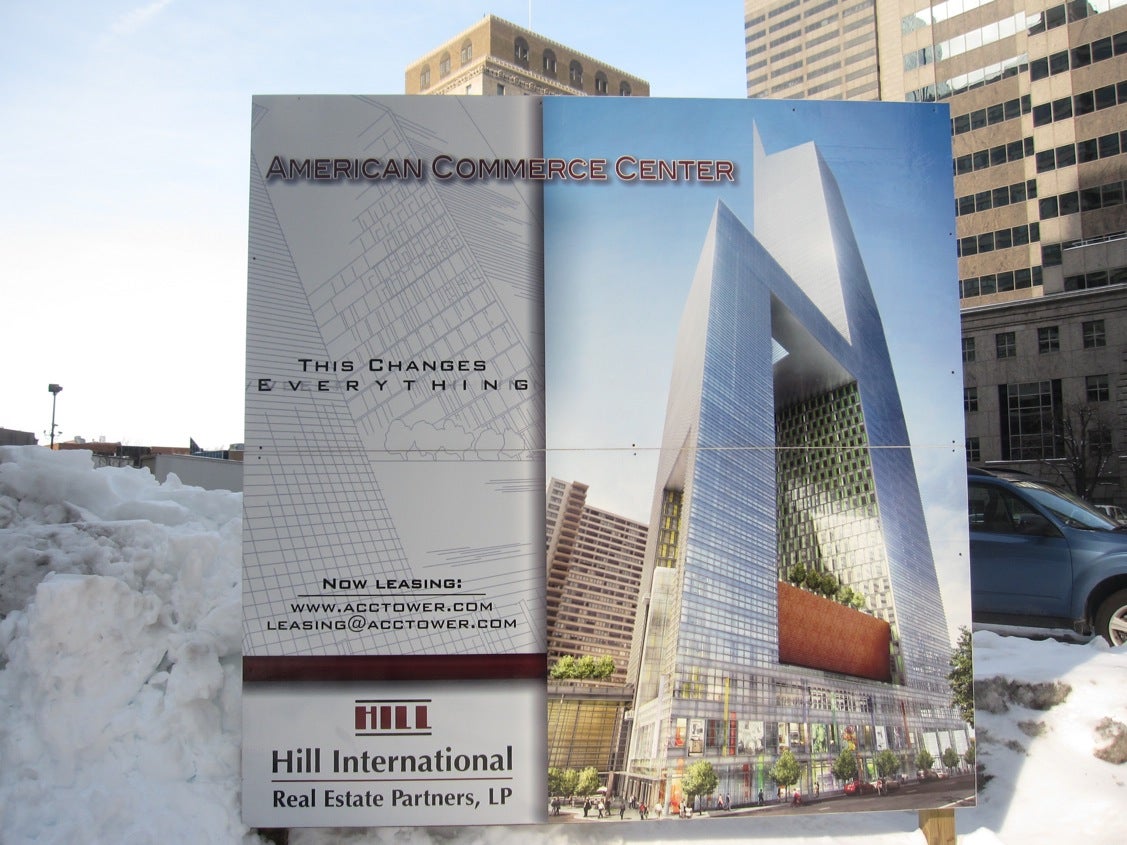Checking in on the ACC development
A proposed 1,500-foot skyscraper that would be the city’s tallest remains a ground-level parking lot. But the American Commerce Center project “is not scrapped,” the developer’s attorney said.
“We’re still looking for a tenant,” said attorney Peter Kelsen.
The developers – Hill International Real Estate Partners – are talking to a number of businesses in hopes of finding someone to fill the two-million square feet of space the building would contain, Kelsen said. “But until a large tenant is secured … we will not build on spec.” he said.
In 2008, the structure designed by Philadelphia native and world-renowned architect Eugene Kohn lit up internet message boards and headlined Philadelphia City Planning Commission and City Council meetings. With its enormous leasing potential and 300-foot communications spire, the tower would have surpassed the Comcast Building as the city’s tallest. City planners – including former Deputy Mayor Andy Altman, who is now heading up the planning for London’s 2012 Olympic Games – were excited by the prospect. Why? It promised environmentally-conscious construction would extend the SEPTA concourse, allowing those who worked there to connect more easily with public transit. Advocates from the public praised the building as a forward-thinking boost to Philadelphia’s skyline. Opponents derided it as “a bigger is better boondoogle” that would cut off other buildings sight lines and air.
With the planning commission’s blessing, City Council passed a zoning law that exempted the property from existing height controls. But while winning the zoning change was a huge hurdle, it was not the only one the developer faced. The law introduced by Councilman Darrell Clarke – which gushes with praise for the proposal – required a full plan of development to be brought to the planning commission for approval. That, said Bill Kramer, director of the commission’s development planning division, never happened.
Talks with project neighbors went on for more than a year, said Rob Stuart, a member of the Logan Square Neighborhood Association who was president when ACC was a hot topic. But the talks were not completed, so no agreement exists.
What happened was The Great Recession. None of the prospective tenants Hill International was talking to wanted to make a big leap to a tall building in such an uncertain economy.
The zoning law that City Council passed more than two years ago expired on Jan. 1.
Under normal circumstances, Hill International would have to re-start the process and get new legislation.
In deference to the hardships that developers have faced d uring the recession, the state legislature passed a law last year that provides for extensions to all permits and board approvals set to expire on or after Jan. 1, 2009. An extension through July 1, 2013, is automatically granted, according to a guideline sheet prepared by the city’s Licenses & Inspections Department, but developers must apply and pay “in the amount of one-half of the appeal application fee” to get it.
City Council also passed a similar piece of legislation in May of 2009.
But do the laws apply in this case?
Kelsen said yes. “We still have time,” he said.
But Paul Boni, a Philadelphia zoning attorney who has researched the law for clients, said “board approvals” means things like zoning board votes and administrative actions and would not apply to an action of city council.
“I hear people toss around the idea that the state law extends everything, and it doesn’t,” he said.
The law states: In cities of the first class and agencies established by such cities, the term shall include only the issuance of a building permit, a zoning use and registration permit, and any administrative approval, including an approval by a board or commission, that is a condition precedent to issuance of a building permit or zoning use and registration permit to an owner of property.
L&I Deputy Commissioner for Development Mike Fink has a nuanced view. He interprets both the state and local laws as applying to permits and approvals only, not city council ordinances. And he believes it was not the intent of either city council or the state legislature to create a way to extend sunsetted council ordinances.
However, Fink said, the somewhat confusing wording of the state law and the rather unusual character of the ACC ordinance create an opening for an attorney to argue that the extension laws should apply to the ACC ordinance.
“Typically, councilmatic ordinances don’t relate to a particular development project,” Fink said. But this one does – it names the development specifically, and changes zoning so that the ACC can go forward.
“I don’t even think you would need a good attorney to make an argument that this is a development approval and it should be extended based on that act,” Fink said.
PlanPhilly tried several times to reach Kelsen again after realizing an application and fee were necessary for an extension and questions arose about whether the law would apply, but he could not be reached a second time. During the initial interview, Kelsen said that not only was ACC eligible for an extension, but “We don’t view (the July 2013 date in the legislation) as a deadline, either. If we need to extend, I’m sure we would go forward with a request and get it approved,” he said.
Kelsen said Hill International has not given itself any sort of internal deadline by when it would walk away from the project if no large tenant were found. It should be noted that Hill is the largest independent U.S. construction management firm (for fee only), according to Engineering News-Record magazine.
Hill International has one big advantage over other developers in similar situations, Kelsen said. “We own the land.” Hill is also “comfortable with our financing,” Kelsen said. He would not reveal where the money was coming from.
Were it not for the recession, Kelsen said, the building would be “well out of the ground. A myriad of projects around the country are in circumstances similar to the American Commerce Center. They have gone slower or have been put on hold.”
The development attorney said things seem to be thawing – he is putting in a lot more hours lately, for one.
The hope is that some businesses will feel confident enough to sign on for a big move to a big, new building, he said.
Kelsen said that once a major tenant or tenants is secured, it will take two or two-and-a-half years to finish construction. Once the project is moving forward again, talks would resume with neighbors, and a plan of development would be brought to the planning commission. When asked if there have been any design changes since the project was last in the public eye, Kelsen said, “none that I can discuss publicly.”
Logan Square Neighborhood Association never voted on the bill that resulted in the zoning change, Stuart said, because association members felt they did not yet have enough information to do so. Association representatives told city council that they believed a vote on the zoning change bill was premature.
Logan Square was not satisfied with the project, and intended to keep negotiating with the developer, Stuart said, but it’s been crickets for a long time. And he would be surprised if the project got moving again.
“At this point, I doubt we will have the tallest building between New York and Chicago there,” he said. “My sense is that at some point, somebody will propose something more modest in scale, but a similar mix of retail and possibly a hotel.”
These days, Logan Square Neighbors and the Planning Commission are talking about another proposed development a block away from the American Commerce Center site at Arch and 19th Streets. The Planning Commission discussed developer Eric Blumenfeld’s hopes of bringing a three-building complex of 236 apartments, 10,000 square feet of office space and two restaurants to 19th and Arch site. The discussion was information only.
Stuart said Logan Square Neighbors has been pleased so far with the talks the developer has had with the nearest neighbors – including those who live at Kennedy House. The developer has been responsive, he said, and that has lead to some design elements – including the massing of one building into three steps that have resulted in the portion of the building furthest away from Kennedy House being the highest. The massing strategy means this project, too, will need relief from the height regulations on the site.
More talks with neighbors and the entire neighborhood are coming, Stuart said. But so far “the process has yielded something innovative, green, and consistent with our neighborhood plan,” he said.
One of the things Logan Square Neighbors still wants to discuss with the developer is what, if anything, they have planned for a lot they own across the street from the proposed buiding, next to the Russell Byers Charter School, which is at 1911 Arch Street.
“We have had our eyes on enhancing and expanding the school,” Stuart said.
Note: This story contains a correction. In the original version, it was reported that Logan Square Neighborhood Association supported the ACC zoning change bill. LSNA never voted on the bill because members felt they needed more information. PlanPhilly regrets the error.
Reach the reporter at kgates@planphilly.com
WHYY is your source for fact-based, in-depth journalism and information. As a nonprofit organization, we rely on financial support from readers like you. Please give today.





